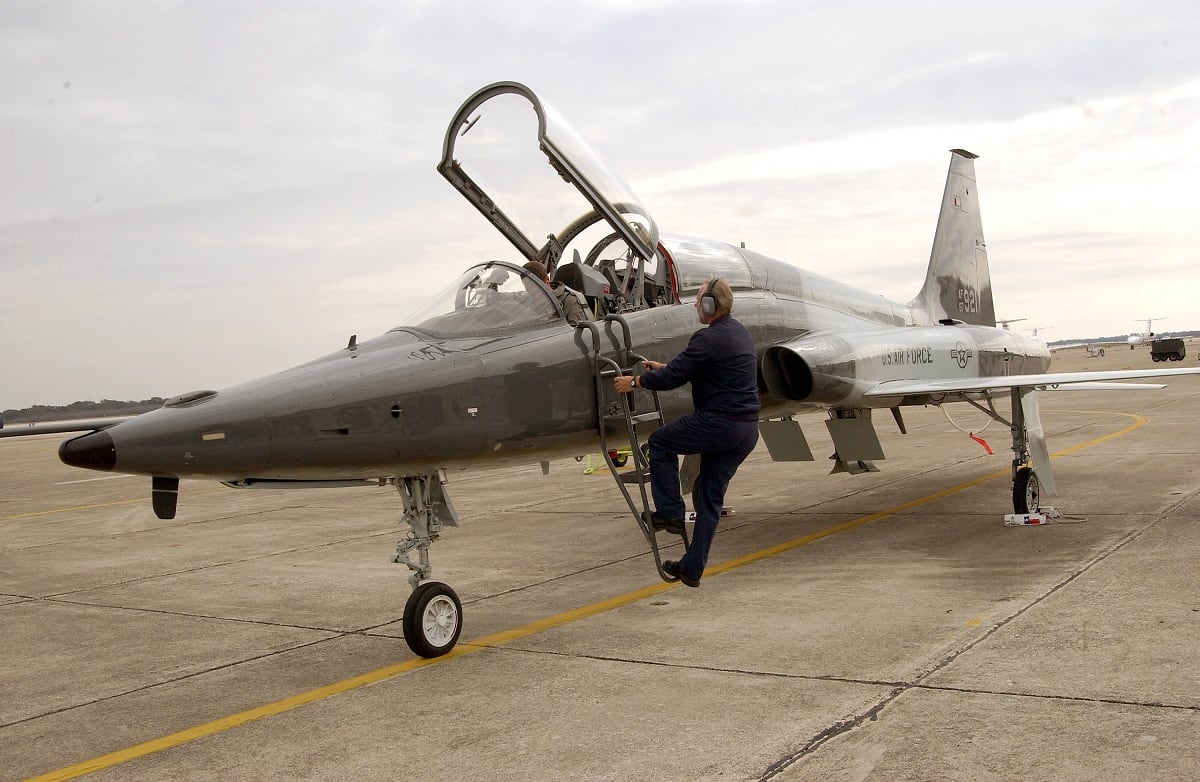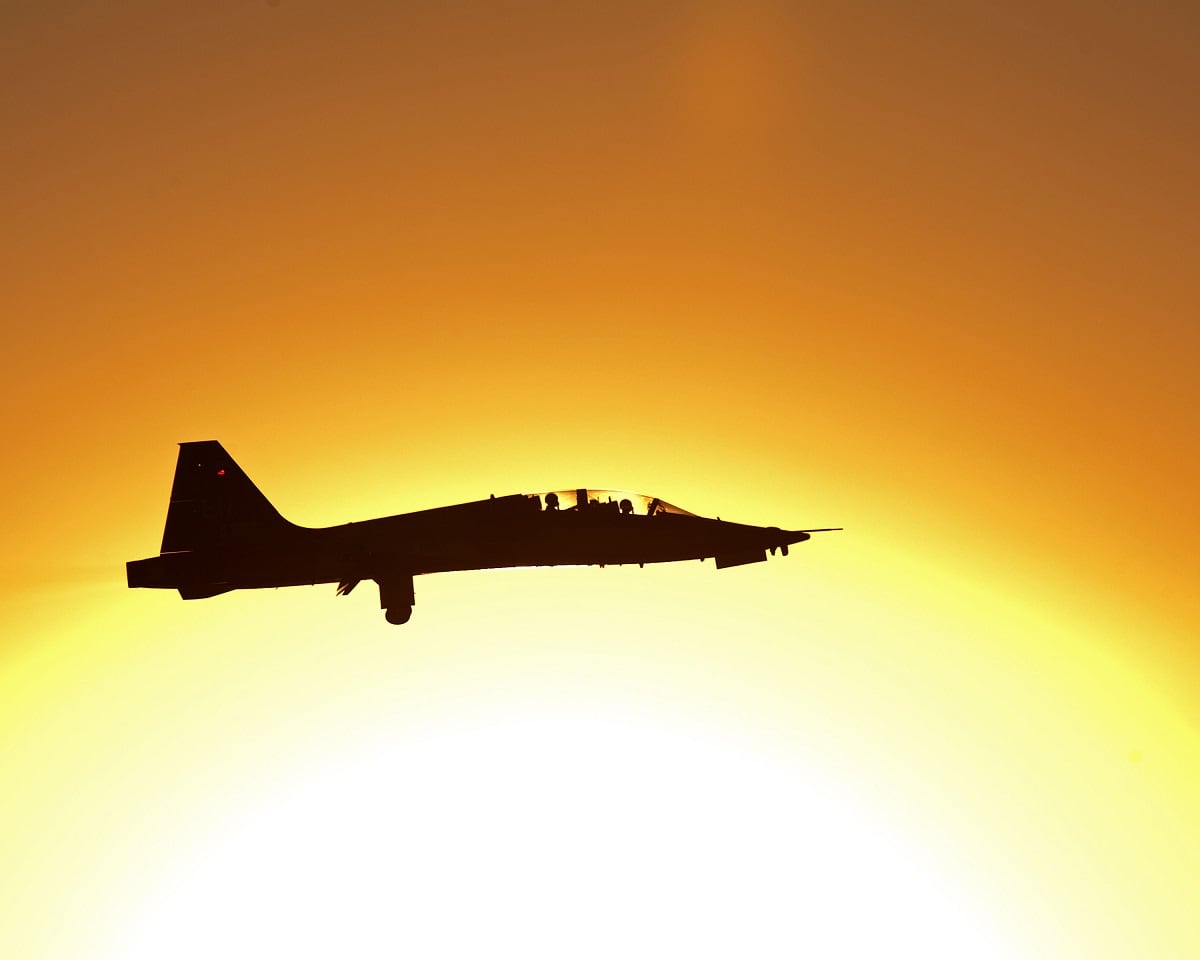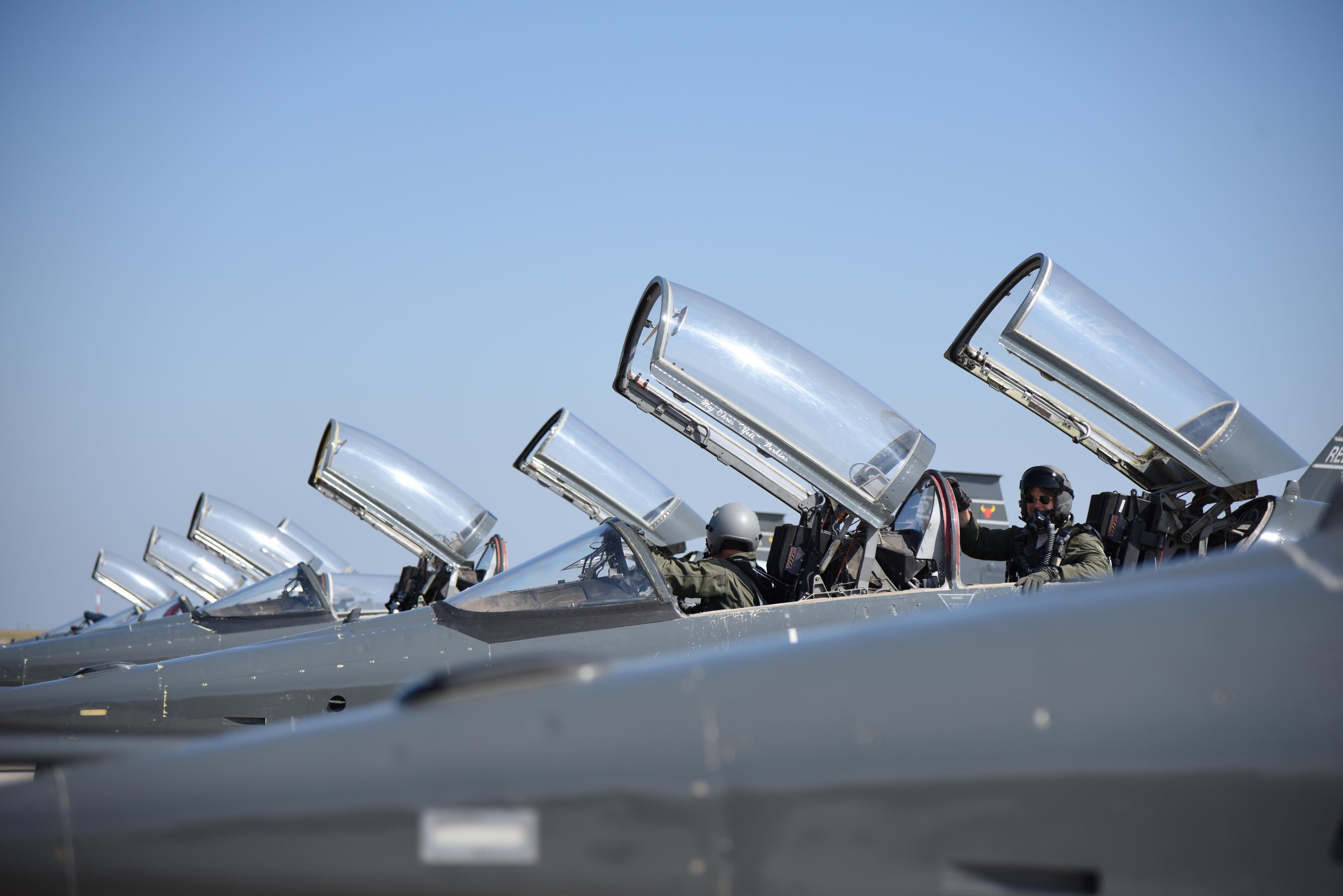There are two types of women who fly in Combat Air Forces, a female student pilot was told by her flight commander in early 2018.
First, there are the “bros,” female pilots who have “tough skin” and simply shrug off offensive comments, the flight commander told her during a mid-term feedback session after her checkride in a T-38. These women are more likely to be chosen for leadership positions, he said.
Then there are those women who are “easily offended,” he said, according to her responses to a May 1, 2018, commander-directed investigation into harassment, sexual misconduct, hazing and other misconduct in the 87th Flying Training Squadron, part of the 47th Flying Training Wing at Laughlin Air Force Base in Texas. Their future opportunities would be limited, he implied.
One thing that didn’t factor into his calculus, he told her: Flying ability.
Her heart sank as she listened to her superior officer rattle off stereotypes about female pilots. It wasn’t the first time she had experienced sexism while learning to fly in the 87th — and it wouldn’t be the last.
The investigation, obtained by Air Force Times through the Freedom of Information Act, provides more context to the misconduct and leadership failures that led to the abrupt firing of three commanders in October 2018, including the former wing commander of the 47th.
But it also shows how an Undergraduate Pilot Training flight’s culture can deteriorate under the command of an officer who made what investigators called “sexist remarks,” demeaned female pilots and allowed an atmosphere of sexism to fester.
It also provides a glimpse of the challenges women can face while trying to break into the heavily male-dominated world of Air Force pilots. An environment that goes wrong, the report shows, can lead to promising female aviators feeling like they have to stay silent and endure sexual harassment to avoid derailing their careers.
In a statement provided to Air Force Times, Maj. Gen. Craig Wills, commander of the 19th Air Force that oversees flying training, said harassment in any form, or actions that degrade or marginalize anyone, is unacceptable in his command or the Air Force.
“AETC and 19th Air Force are committed to fostering a climate where every airman feels welcome, valued and included,” Wills said. “Every flying instructor in AETC is held to a high standard.”
Wills said that to make sure problems like the harassment in the 87th doesn’t happen again, the 19th has improved its training and increased reporting requirements. It also continues to hold commanders accountable for their unit climate and their airmen’s health and success.
“While the vast majority of our instructor force is setting an excellent example, we will deal swiftly and firmly with any reports of conduct that fails to match our standards,” Wills said. “We owe our airmen, family members and citizens an Air Force that exemplifies our national aspirations and ideals.”
The Air Force has grown increasingly concerned in recent years about the lack of diversity in its pilot corps, and has sought to try to remove barriers that prevent or discourage women and minorities from trying to become pilots. Last year, the service said only 6 percent of its pilots were women.
RELATED

In October 2018, now-retired Lt. Gen. Steven Kwast, former head of Air Education and Training Command, announced the firings within the 47th in the wake of multiple investigations into misconduct. AETC also released another heavily-redacted report in December 2018 that outlined the failures of an “absentee leadership” that did not correct unsafe situations, and fostered both the disrespectful treatment of some students and a booze-soaked culture gone awry.
In early November 2018, AETC said the misconduct included a vulgar and sexist call sign that was given to a female student pilot. That student’s experiences in the 87th were the subject of the investigation obtained by Air Force Times.

But even beyond the call sign, that student encountered a pattern of sexist behavior while learning to fly. The commander of her flight, called Mother Flight, was most often the one making the inappropriate comments, or allowing them to be made without intervening to stop them.
The call sign incident happened in November 2017 during a traditional naming party following the student pilots’ first solo flights. Instructor pilots were there to pre-emptively reject or change suggested call signs. The students voted on potential call signs by cheering the loudest for the one they liked, while the pilot being named was out of the room.
When the female student was brought back in and told the call signs they had chosen for her — the second dropped a single letter from the vulgar one — she didn’t raise an objection, the report said. She told the others she did not feel offended by either call sign.
But, “it was apparent to many in attendance that [she] was not content with her assigned call sign.” She was one of just two women in the class, and in the room at that time, AETC said.
Afterward, the flight commander — who was present during the naming party and acted as the “mayor” running the roll call-style event — told the student pilot he was glad she received the most vulgar call sign, according to the report. He implied he was happy she was not offended by it.
It was also the only time she could recall anyone actually calling her — to her face — the most vulgar version of the call sign, according to the report. Others stuck to the slightly cleaned-up version.
This constituted harassment, investigators concluded. Although other students were the ones who chose the vulgar call sign, the flight commander and other instructors stayed silent and allowed it — both by refusing to veto it before the vote and by not nixing it after it was selected. This, investigators concluded, “led to an environment where harassment was understood to be acceptable.”
It didn’t matter that the female student said she didn’t take offense to it, the report said, as any reasonable person would conclude it was offensive, and it was clear she was not OK with it.
The report describes a tense atmosphere in the mid-term feedback session that took place in early 2018, in the wake of the naming party.
The flight commander “made comments beyond the scope” of what would normally be said to a student in a standard feedback session, the report said, as well as making those comments in front of the new assistant flight commander.
“[H]e told her he was ‘very concerned’ when he found out there was a female in the flight room while he was flight commander,” the report said.
This surprised and worried the student, the report said. It seemed to her that he viewed her presence there “in a negative light.”
Even more worrying to her: The flight commander held a great deal of sway over the rankings of student assignments and controlled 20 percent of her final score. The future of her career was in his hands.
When she asked why he felt this way, he laid out his theory that female “bros” were more likely to be chosen for leadership positions than the “easily offended, regardless of flying ability,” the report said.
She was troubled, the report said, and her perception of him had become “tainted.” She started to worry that he might treat her differently because of these views.
RELATED

The investigators said the flight commander’s comments reinforced her belief that she had to stay quiet and endure the offensive call sign.
It “furthered the intimidating and offensive environment by suggesting that if she wanted to perform well in pilot training and score well … that she had to continue to acquiesce to the environment he created and continue to be a ‘bro.’ ”
The report laid out other instances in which the student pilot felt interactions with the flight commander were inappropriate, and worsened her concerns about her future opportunities.
One such conversation had to do with her chances of becoming a First Assignment Instructor Pilot, or FAIP. The Air Force only has a small number of coveted FAIP positions available, in which new pilots graduate from Undergraduate Pilot Training and immediately become instructor pilots.
But about two months after the midterm feedback session, the flight commander told the female student, “I can’t FAIP you,” the report said.
She was confused, and when she asked why, he said he didn’t want people to think he was showing favoritism toward her by choosing her for an instructor job in the 87th. Another flight commander, he said, had recently chosen a female student for a FAIP position, and rumors spread that he had feelings for her.
If the flight commander chose this student pilot for the same desired job, he was concerned he would get the same reputation, the report said.
She began to worry more about her career, the report said, and thought about talking to leadership about her concerns.
A few days later, though, the flight commander admitted to her he was wrong to say he couldn’t choose her for a FAIP assignment. He told her she would be a “great addition” to the 87th if she was chosen. He even promised to “rack and stack” all the students by their Merit Assignment Selection System scores and go down the list fairly — though the report said this ended up not happening.
In another instance, while taxiing back with the student pilot after a training sortie, the flight commander suddenly said that he thought he saw her making out with an instructor pilot from another base at a bar a month or two earlier.
The student pilot said she was “dumbfounded,” and didn’t know what he was talking about. Even more, she was shocked he would not only say such a thing to a student, but that he said it in an aircraft on a student sortie.
Unprofessional behavior
Other instructor pilots raised concerns to investigators about the flight commander’s “intense” personality and leadership style.
Some said he would “verbally berate” anyone who disagreed with him, and instructors repeatedly cited incidents where they saw him loudly and unprofessionally arguing with other instructors, even in front of students. Several said he was focused on maintaining appearances.
The flight commander tried to develop a “fighter pilot culture” in Mother Flight, the report said — even though he was a C-17 pilot from Air Mobility Command who lacked experience with that culture.
“His view of stereotypical fighter pilot culture, which consists primarily of his own [specialized UPT experience], … meshes well with the students’ expectations of what a fighter community does,” the report said. “The longer a student knew [the flight commander], the more they liked him. Conversely, the longer an instructor knew [him], the less they liked him.”
One student described the flight commander’s reaction to the offensive call sign at the naming party as being “like Caesar appeasing the commoners,” the report said — “doing just enough to feel as though he had control, but mostly caring about staying in the students’ good graces.”
In a withering broadside that concluded the flight commander was derelict in his duties, the report said his desire to earn students’ appreciation “led directly to him ignoring a glaring case of harassment and sexual harassment” during the naming party.
The flight commander “failed in his duty as [an] officer and a leader by letting his sexist personal opinions cloud his judgment and directly related to the hostile and offensive environment that [the student pilot] had to deal with for six months of Phase III training,” the report said.
The investigation also concluded the flight commander’s conduct was unbecoming of an officer and a gentleman, in violation of the Uniform Code of Military Justice.
AETC provided a list of changes that have already been put in place, or are in the works, across the 19th Air Force to ensure flying students don’t encounter harassment.
At Laughlin, AETC officials said, instructor pilots must take a five-part course on professional relationships, emphasizing how to build a professional instructor-student relationship and the importance of building a diverse and inclusive learning environment.
The operations group commander at Laughlin also set up a private line students could use to anonymously report discomfort or dissatisfaction with their training experience. And the 87th, in particular, “significantly” increased its percentage of female instructor pilots, AETC said.
“These female instructors are exceptional leaders and great mentors to incoming female student pilots,” AETC said.
AETC and the 19th Air Force has worked to ensure an “inclusive, healthy climate in all our flying training units,” including by increasing staff’s focus on sexual harassment problems.
The 19th began using a standardized flight commander course for all instructors, AETC said. It placed first sergeants and squadron superintendents in each flying training squadron to advise commanders and help work on issues with new officers.
AETC prohibited gifts between students and instructors that could contribute to unprofessional actions and expectations. It also included sexual assault and prevention training into squadron commander courses.
AETC is also still working on adding an ethics training course for instructor pilots, which includes scenarios, called “What Now IP?” It is setting up a diversity and inclusion task force, working on improving representation in undergraduate aviation training classes and developing new feedback mechanisms to let students report concerns in real time.
It is considering setting up an app-based system to help evaluate how effective training is and how healthy the unit climate is. AETC is also considering whether to add a dedicated student advocate to undergraduate training programs, similar to the Military and Family Life Counseling program, who would be a “voice” for the students and improve communication and trust between instructors and students.
Stephen Losey is the air warfare reporter for Defense News. He previously covered leadership and personnel issues at Air Force Times, and the Pentagon, special operations and air warfare at Military.com. He has traveled to the Middle East to cover U.S. Air Force operations.





